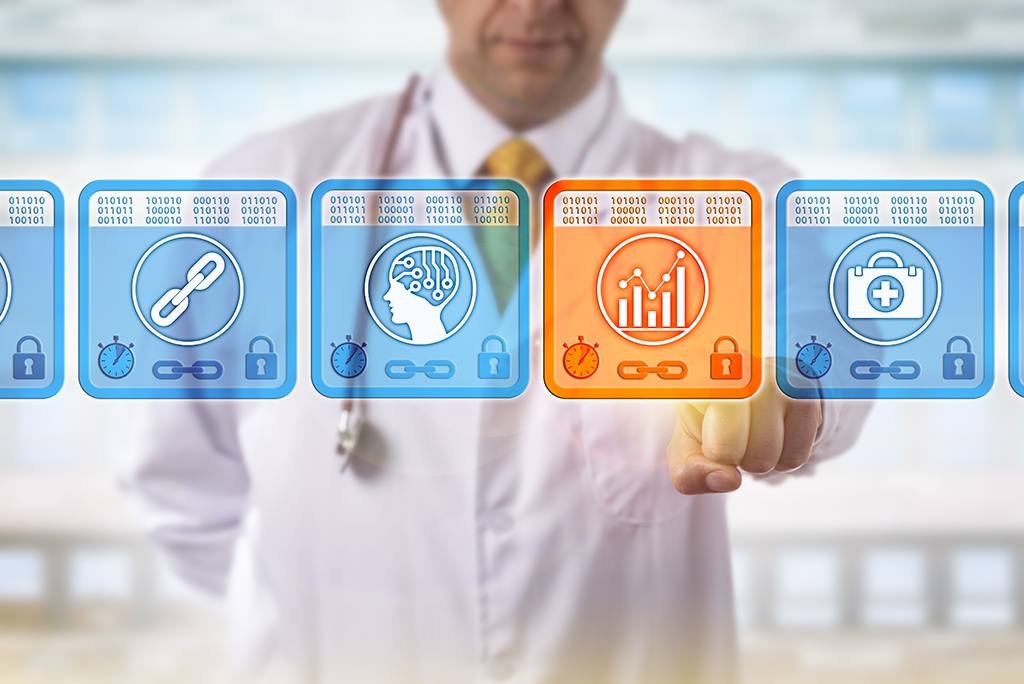
Healthcare organizations are under increasing attack from hackers. According to a report published by the Protenus 2019 Breach Barometer, hackers accessed more than 15 million patient records in 503 breaches during 2018. The following year, there was a reported 60% growth in breaches. Furthermore, most of these breaches weren’t reported within the 60 days mandated by the U.S. Health Insurance Portability and Accountability Act. Recently, a number of cyber attacks against research organizations working to develop COVID-19 vaccines have demonstrated a pressing need to secure healthcare data.
As discussed in a previous post, blockchain adoption is critical to healthcare in a variety of ways. For example, distributed ledger technology could allow researchers to securely share information and collaborate in order to solve complex medical problems in addition to reducing mistakes in medical records. Perhaps most importantly, blockchain technology can help secure confidential healthcare data across a decentralized network. Due to the complicated structure of blockchain, a hacker trying to access data would need to be able to control every computer within the network. Additionally, since each patient owns their data in the system, it’s only accessible to the individuals or entities the patient allows. This process provides another crucial layer of security.
Why is Blockchain Challenging to Adapt?
Despite the many advantages blockchain offers, it still poses the following challenges for healthcare organizations, according to DevPro Journal.
- Blockchain is a relatively new technology that has a shared history with the cryptocurrency Bitcoin. Because many people primarily associate blockchain with cryptocurrency, some medical research communities are skeptical of its applicability to their field.
- In order for blockchain to function, every organization involved in patient care and medical research needs to be on board and willing to adapt to the many changes this new technology will demand.
- How will unconscious patients provide the security key necessary to obtain their files? Medical bracelets with biometrics security are potential solutions.
- Due to its ledger legacy, blockchain may have trouble supporting large data files (for example, MRIs and CAT scans images) in a single transaction. As a result, organizations will need to employ backend repositories and encoded libraries to house and track large files.
- Because blockchain doesn’t permanently delete or replace altered records—rather, it simply adds more blocks to the chain—there’s a growing need for need for more storage, which poses both financial and technical challenges.
- There needs to be a way to integrate blockchain into healthcare systems without adding additional steps for already-overburdened healthcare professionals when entering data into the system.
Still, the benefits of blockchain to healthcare may far outweigh the challenges. When coupled with artificial intelligence, blockchain has the power to dramatically transform healthcare. Some major healthcare organizations are already adopting blockchain technology. For example, Mount Sinai in New York City is using blockchain in an AI model to quickly read chest CAT Scans of patients in order to detect COVID-19, which is more reliable than traditional tests, such as swabs and blood tests. Not only does such technology quicken the pace of identifying infected people, it also helps prevent the spread of the virus.
With numerous ways that the technology could transform healthcare, blockchain is poised to have lasting impact on the industry.
Understanding Enterprise Blockchain
What other industries can benefit from blockchain technology? Enterprise Blockchain for Healthcare, IoT, Energy, and Supply Chain is a five-course program from IEEE. Developed by leading experts in blockchain technology, this advanced program provides business use cases across key industries and sectors. It’s ideal for managers, professional engineers, and business leaders.
Contact an IEEE Content Specialist to learn more about how this program can benefit your organization.
Interested in getting access for yourself? Visit the IEEE Learning Network (ILN) today!
Resources
Elliott, Mark and Staynings, Richard. (3 September 2020). What Stands in the Way of Healthcare Blockchain Adoption? DEVPRO Journal.
Protenus 2019 Breach Barometer. Protenus.


No comments yet.